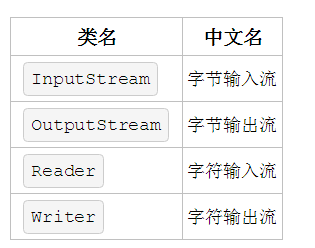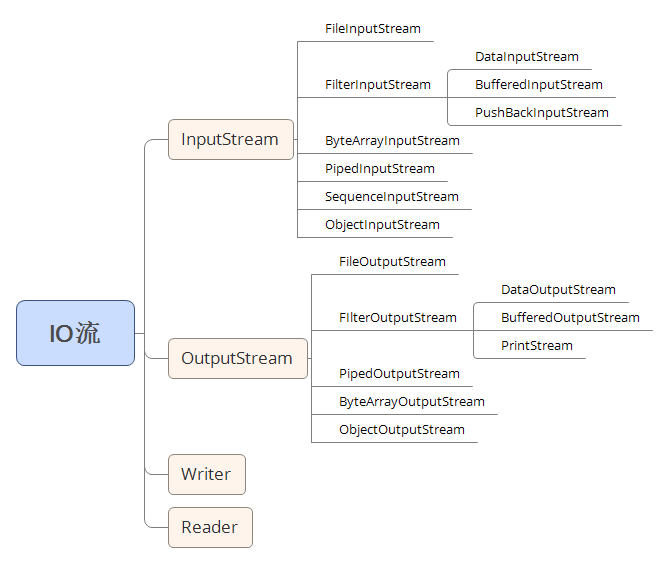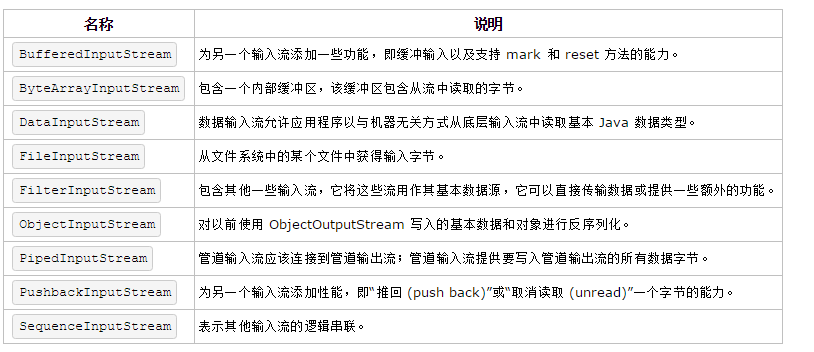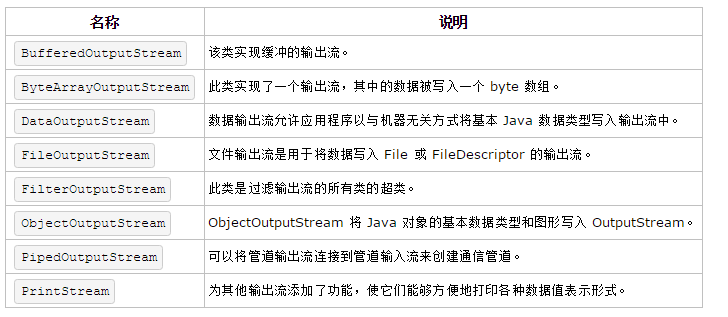Java-Byte-Stream
- 高洛峰Original
- 2016-10-20 16:41:442114Durchsuche
Java中的输入是指从数据源等读到Java程序中,这里的数据源可以是文件,内存或网络连接,输出则是指从Java程序中写到目的地。
输入输出流可以分为以下几种类型(暂时不考虑File类)

Java IO共涉及40多个类,下图是字节流各个类之间的关系

InputStream
InputStream的子类及其说明有如下所示

OutputStream
OutputStream的子类及其说明有如下所示

对于类中方法的熟悉不详述了,可以参照JDK文档,或者可以试着在IDE中,实例化上面的类,使用此类对象时,按下.之后,会出现提示框,再一个一个熟悉就好了。
简单示例
了解了常用的字节流类,下面以文件数据的输入输出说明以上类的使用。
1.在java程序中生成1~20的平方数,并输出到文件中。
package com.songpu;import java.io.BufferedOutputStream;import java.io.FileOutputStream;import java.io.IOException;import java.io.PrintStream;public class MyFileOutputStream {
public static void main (String[] args) throws IOException{ try{
FileOutputStream fos = new FileOutputStream("F:\\test1.txt");
BufferedOutputStream bos = new BufferedOutputStream(fos,1024);
PrintStream ps = new PrintStream(bos,false);
System.setOut(ps); for(int i= 0;i<20;i++){
System.out.println(i*i);
}
ps.close();
}catch(IOException e){
e.printStackTrace();
}
}
}2.将刚才生成的文件中的数据输入到程序,并将其打印到屏幕
package com.songpu;import java.io.*;public class MyFlieInputStream { public static void main(String[] args) throws IOException {
File file = new File("F:\\test1.txt");
FileInputStream in = new FileInputStream(file);
BufferedInputStream bis = new BufferedInputStream(in); byte[] bytes = new byte[(int) file.length()];
do {
bis.read(bytes);
System.out.println(new String(bytes));
}while (bis.read() != -1);
in.close();
}
}再以序列化与反序列化的例子说明ObjectInputStream和ObjectOutputStream的使用
Java序列化是将对象变成二进制形式的一连串字符描述的过程,反序列化就是序列化的相反过程,把这些字符重建为对象。
序列化和反序列化的作用,是保存对象到文件或数据库中,使对象能够传输,序列化的要求是实现Serializable接口,代码如下所示
package com.songpu.serial;import java.io.FileInputStream;import java.io.FileOutputStream;import java.io.IOException;import java.io.ObjectInputStream;import java.io.ObjectOutputStream;import java.io.OutputStream;import java.io.Serializable;/*
* 待序列化的类,实现序列化接口
*/class Person implements Serializable{ public String name; public int age; public Person(String name, int age) { super(); this.name = name; this.age = age;
} public String getName() { return name;
} public void setName(String name) { this.name = name;
} public int getAge() { return age;
} public void setAge(int age) { this.age = age;
}
}/*
* 测试类
*/public class SerialTest{ public static void main(String[] args) throws IOException, ClassNotFoundException{
ObjectOutputStream oos = new ObjectOutputStream(new FileOutputStream("F:\\test.txt"));
Person p0 = new Person("tangsong",21);
oos.writeObject(p0);
oos.flush();
oos.close();
deserial();
}
public static void deserial() throws ClassNotFoundException, IOException{
ObjectInputStream ois = new ObjectInputStream(new FileInputStream("F:\\test.txt"));
Person p1 = (Person)ois.readObject();
ois.close();
System.out.println("Name="+p1.getName()+";Age="+p1.getAge());
}
}运行上述代码的结果如下:

Stellungnahme:
Der Inhalt dieses Artikels wird freiwillig von Internetnutzern beigesteuert und das Urheberrecht liegt beim ursprünglichen Autor. Diese Website übernimmt keine entsprechende rechtliche Verantwortung. Wenn Sie Inhalte finden, bei denen der Verdacht eines Plagiats oder einer Rechtsverletzung besteht, wenden Sie sich bitte an admin@php.cn

